Research Proposal: Waste Management in Nigeria - A Study
VerifiedAdded on 2022/11/23
|20
|5517
|300
Report
AI Summary
This research proposal delves into the critical issue of waste management in Nigeria, examining its environmental and social impacts. The proposal begins with an introduction outlining the research aims, objectives, and questions, followed by an extensive literature review. The literature review covers various aspects, including environmental and social injustices imposed by inadequate solid waste management, health impact assessments, hybrid approaches to water law, collaborative environmental practices, the role of the NESREA Act, and the use of recycling approaches. The proposal also identifies gaps in the existing literature and outlines the proposed research methodology. The assignment brief highlights the problem of plastic waste, specifically water sachets, in sub-Saharan Africa, and the social and legal dilemmas associated with their management. The student's research aims to address these challenges, providing insights and potential solutions for effective waste management in Nigeria.
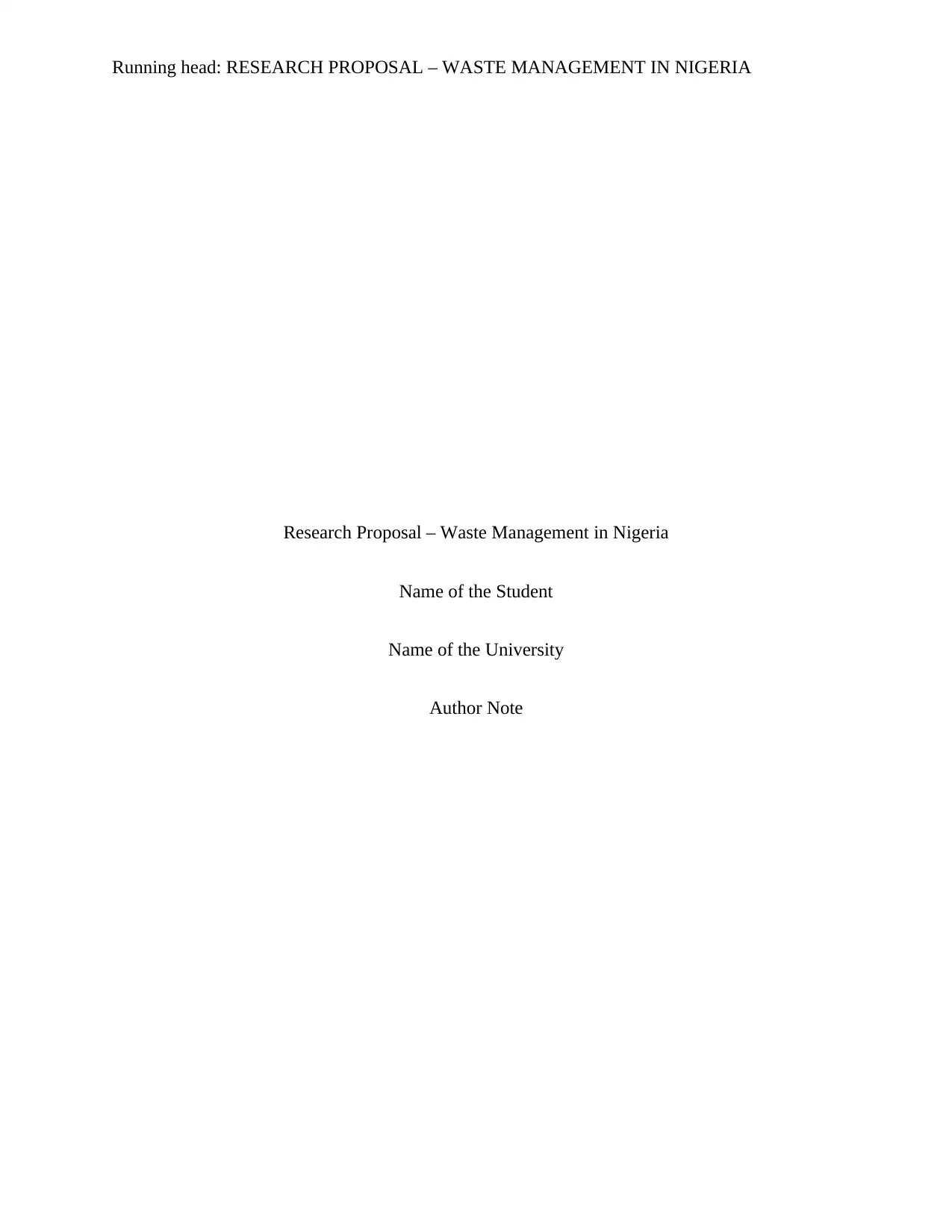
Running head: RESEARCH PROPOSAL – WASTE MANAGEMENT IN NIGERIA
Research Proposal – Waste Management in Nigeria
Name of the Student
Name of the University
Author Note
Research Proposal – Waste Management in Nigeria
Name of the Student
Name of the University
Author Note
Paraphrase This Document
Need a fresh take? Get an instant paraphrase of this document with our AI Paraphraser
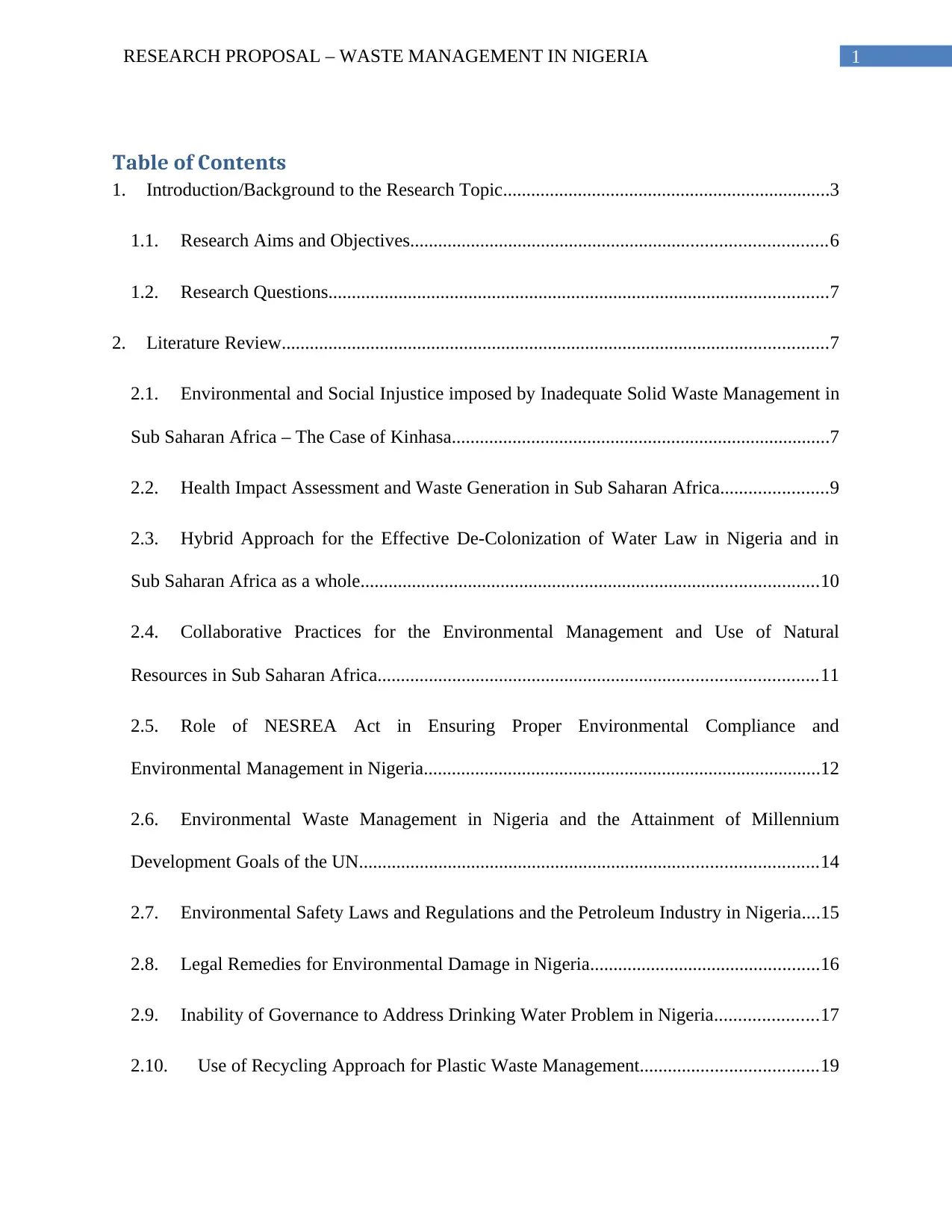
1RESEARCH PROPOSAL – WASTE MANAGEMENT IN NIGERIA
Table of Contents
1. Introduction/Background to the Research Topic......................................................................3
1.1. Research Aims and Objectives.........................................................................................6
1.2. Research Questions...........................................................................................................7
2. Literature Review.....................................................................................................................7
2.1. Environmental and Social Injustice imposed by Inadequate Solid Waste Management in
Sub Saharan Africa – The Case of Kinhasa.................................................................................7
2.2. Health Impact Assessment and Waste Generation in Sub Saharan Africa.......................9
2.3. Hybrid Approach for the Effective De-Colonization of Water Law in Nigeria and in
Sub Saharan Africa as a whole..................................................................................................10
2.4. Collaborative Practices for the Environmental Management and Use of Natural
Resources in Sub Saharan Africa..............................................................................................11
2.5. Role of NESREA Act in Ensuring Proper Environmental Compliance and
Environmental Management in Nigeria.....................................................................................12
2.6. Environmental Waste Management in Nigeria and the Attainment of Millennium
Development Goals of the UN..................................................................................................14
2.7. Environmental Safety Laws and Regulations and the Petroleum Industry in Nigeria....15
2.8. Legal Remedies for Environmental Damage in Nigeria.................................................16
2.9. Inability of Governance to Address Drinking Water Problem in Nigeria......................17
2.10. Use of Recycling Approach for Plastic Waste Management......................................19
Table of Contents
1. Introduction/Background to the Research Topic......................................................................3
1.1. Research Aims and Objectives.........................................................................................6
1.2. Research Questions...........................................................................................................7
2. Literature Review.....................................................................................................................7
2.1. Environmental and Social Injustice imposed by Inadequate Solid Waste Management in
Sub Saharan Africa – The Case of Kinhasa.................................................................................7
2.2. Health Impact Assessment and Waste Generation in Sub Saharan Africa.......................9
2.3. Hybrid Approach for the Effective De-Colonization of Water Law in Nigeria and in
Sub Saharan Africa as a whole..................................................................................................10
2.4. Collaborative Practices for the Environmental Management and Use of Natural
Resources in Sub Saharan Africa..............................................................................................11
2.5. Role of NESREA Act in Ensuring Proper Environmental Compliance and
Environmental Management in Nigeria.....................................................................................12
2.6. Environmental Waste Management in Nigeria and the Attainment of Millennium
Development Goals of the UN..................................................................................................14
2.7. Environmental Safety Laws and Regulations and the Petroleum Industry in Nigeria....15
2.8. Legal Remedies for Environmental Damage in Nigeria.................................................16
2.9. Inability of Governance to Address Drinking Water Problem in Nigeria......................17
2.10. Use of Recycling Approach for Plastic Waste Management......................................19
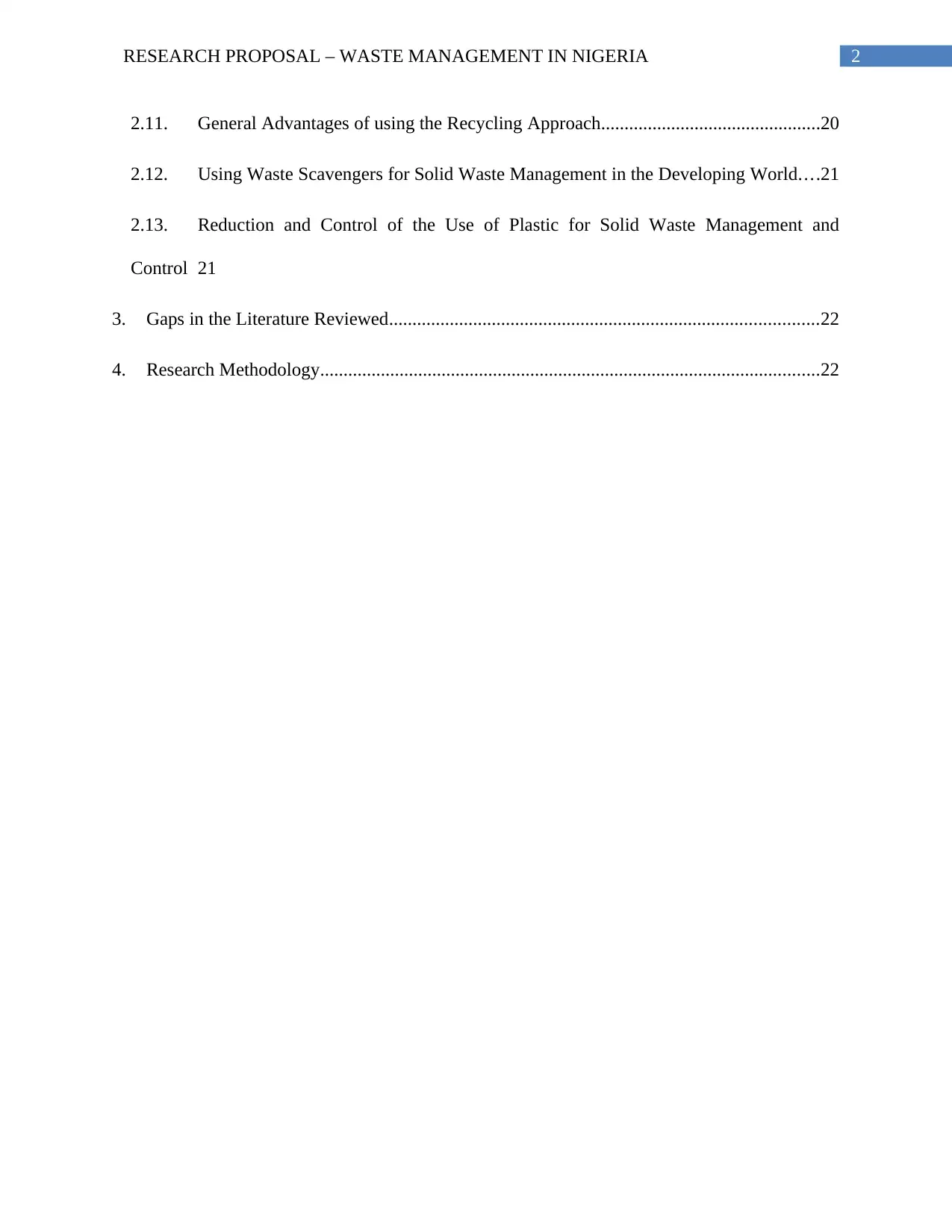
2RESEARCH PROPOSAL – WASTE MANAGEMENT IN NIGERIA
2.11. General Advantages of using the Recycling Approach...............................................20
2.12. Using Waste Scavengers for Solid Waste Management in the Developing World....21
2.13. Reduction and Control of the Use of Plastic for Solid Waste Management and
Control 21
3. Gaps in the Literature Reviewed............................................................................................22
4. Research Methodology...........................................................................................................22
2.11. General Advantages of using the Recycling Approach...............................................20
2.12. Using Waste Scavengers for Solid Waste Management in the Developing World....21
2.13. Reduction and Control of the Use of Plastic for Solid Waste Management and
Control 21
3. Gaps in the Literature Reviewed............................................................................................22
4. Research Methodology...........................................................................................................22
⊘ This is a preview!⊘
Do you want full access?
Subscribe today to unlock all pages.

Trusted by 1+ million students worldwide
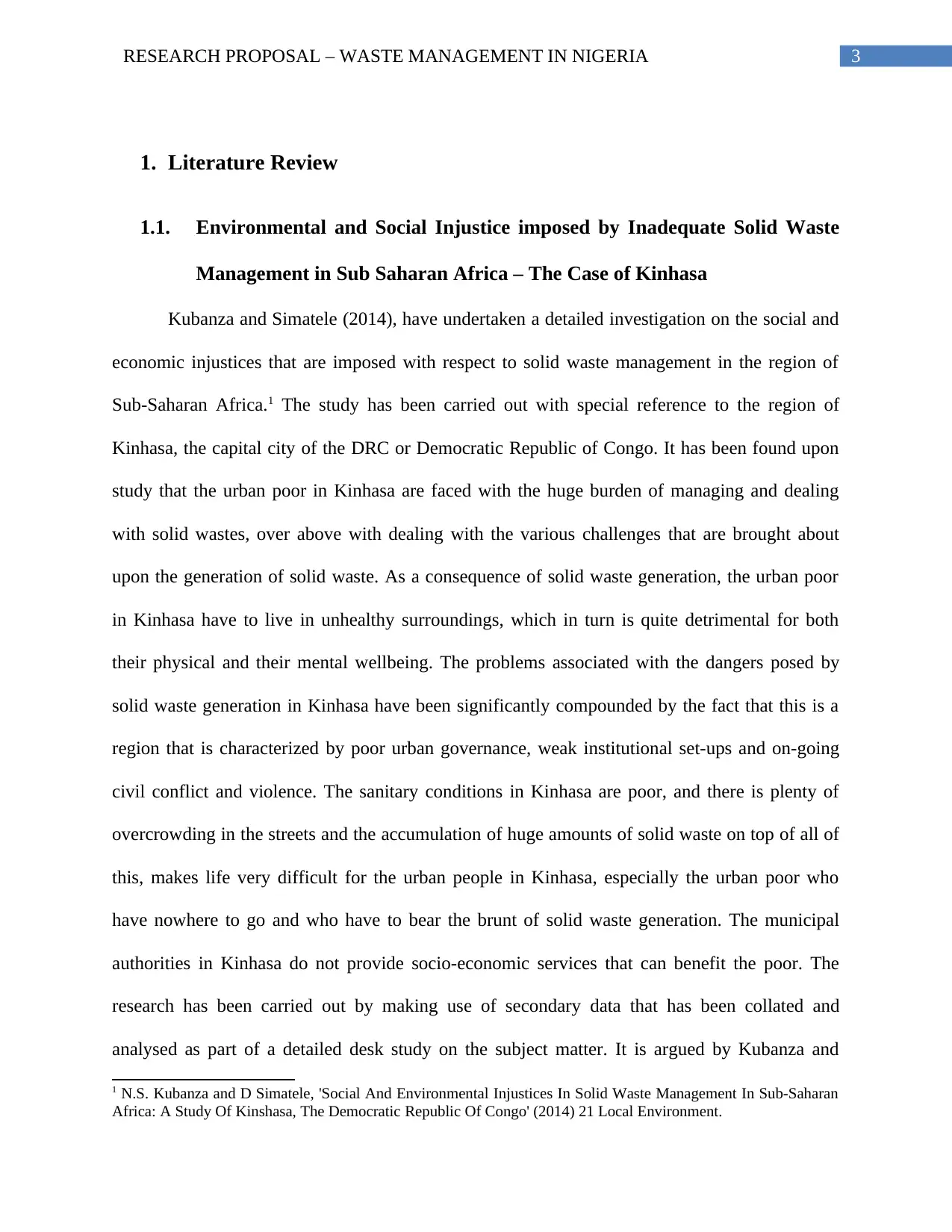
3RESEARCH PROPOSAL – WASTE MANAGEMENT IN NIGERIA
1. Literature Review
1.1. Environmental and Social Injustice imposed by Inadequate Solid Waste
Management in Sub Saharan Africa – The Case of Kinhasa
Kubanza and Simatele (2014), have undertaken a detailed investigation on the social and
economic injustices that are imposed with respect to solid waste management in the region of
Sub-Saharan Africa.1 The study has been carried out with special reference to the region of
Kinhasa, the capital city of the DRC or Democratic Republic of Congo. It has been found upon
study that the urban poor in Kinhasa are faced with the huge burden of managing and dealing
with solid wastes, over above with dealing with the various challenges that are brought about
upon the generation of solid waste. As a consequence of solid waste generation, the urban poor
in Kinhasa have to live in unhealthy surroundings, which in turn is quite detrimental for both
their physical and their mental wellbeing. The problems associated with the dangers posed by
solid waste generation in Kinhasa have been significantly compounded by the fact that this is a
region that is characterized by poor urban governance, weak institutional set-ups and on-going
civil conflict and violence. The sanitary conditions in Kinhasa are poor, and there is plenty of
overcrowding in the streets and the accumulation of huge amounts of solid waste on top of all of
this, makes life very difficult for the urban people in Kinhasa, especially the urban poor who
have nowhere to go and who have to bear the brunt of solid waste generation. The municipal
authorities in Kinhasa do not provide socio-economic services that can benefit the poor. The
research has been carried out by making use of secondary data that has been collated and
analysed as part of a detailed desk study on the subject matter. It is argued by Kubanza and
1 N.S. Kubanza and D Simatele, 'Social And Environmental Injustices In Solid Waste Management In Sub-Saharan
Africa: A Study Of Kinshasa, The Democratic Republic Of Congo' (2014) 21 Local Environment.
1. Literature Review
1.1. Environmental and Social Injustice imposed by Inadequate Solid Waste
Management in Sub Saharan Africa – The Case of Kinhasa
Kubanza and Simatele (2014), have undertaken a detailed investigation on the social and
economic injustices that are imposed with respect to solid waste management in the region of
Sub-Saharan Africa.1 The study has been carried out with special reference to the region of
Kinhasa, the capital city of the DRC or Democratic Republic of Congo. It has been found upon
study that the urban poor in Kinhasa are faced with the huge burden of managing and dealing
with solid wastes, over above with dealing with the various challenges that are brought about
upon the generation of solid waste. As a consequence of solid waste generation, the urban poor
in Kinhasa have to live in unhealthy surroundings, which in turn is quite detrimental for both
their physical and their mental wellbeing. The problems associated with the dangers posed by
solid waste generation in Kinhasa have been significantly compounded by the fact that this is a
region that is characterized by poor urban governance, weak institutional set-ups and on-going
civil conflict and violence. The sanitary conditions in Kinhasa are poor, and there is plenty of
overcrowding in the streets and the accumulation of huge amounts of solid waste on top of all of
this, makes life very difficult for the urban people in Kinhasa, especially the urban poor who
have nowhere to go and who have to bear the brunt of solid waste generation. The municipal
authorities in Kinhasa do not provide socio-economic services that can benefit the poor. The
research has been carried out by making use of secondary data that has been collated and
analysed as part of a detailed desk study on the subject matter. It is argued by Kubanza and
1 N.S. Kubanza and D Simatele, 'Social And Environmental Injustices In Solid Waste Management In Sub-Saharan
Africa: A Study Of Kinshasa, The Democratic Republic Of Congo' (2014) 21 Local Environment.
Paraphrase This Document
Need a fresh take? Get an instant paraphrase of this document with our AI Paraphraser
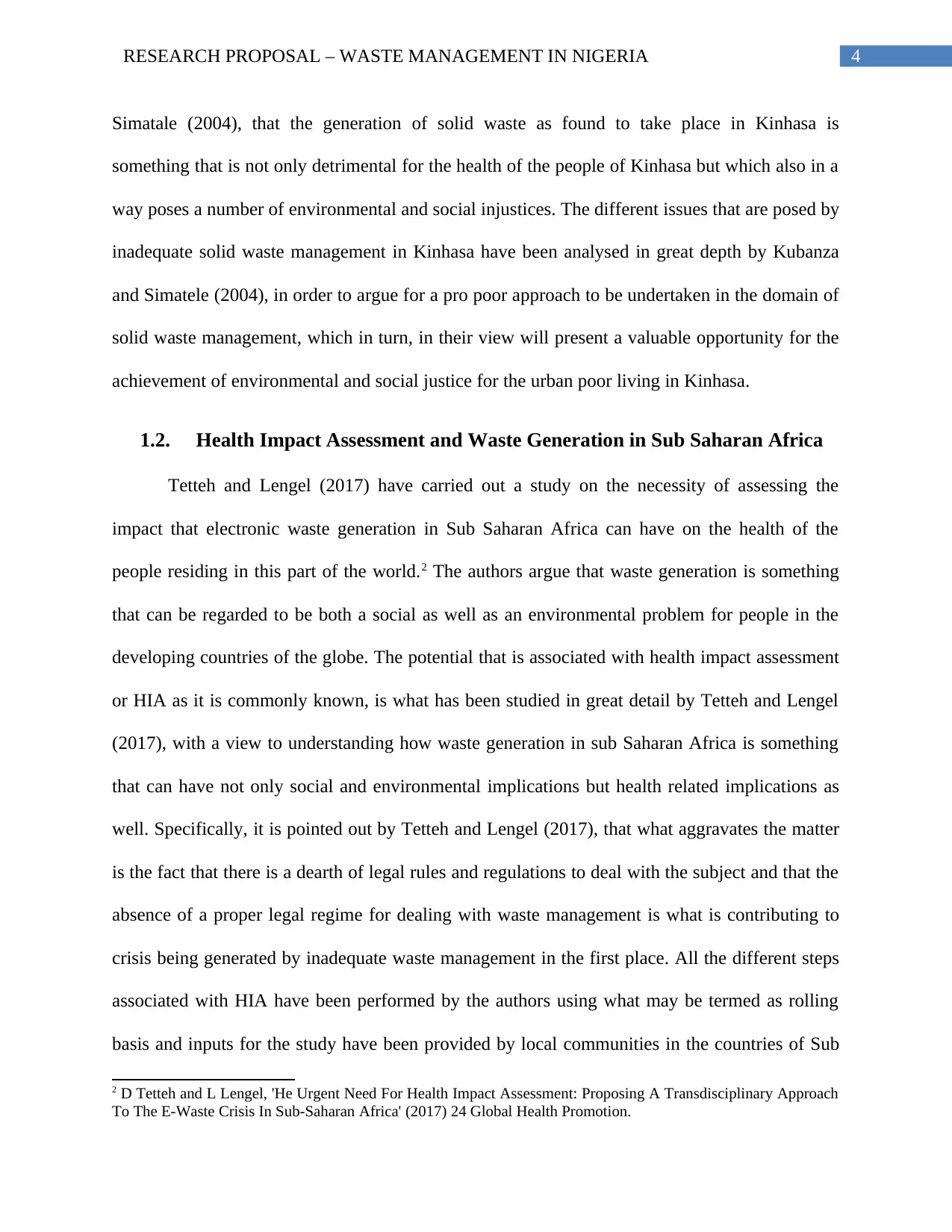
4RESEARCH PROPOSAL – WASTE MANAGEMENT IN NIGERIA
Simatale (2004), that the generation of solid waste as found to take place in Kinhasa is
something that is not only detrimental for the health of the people of Kinhasa but which also in a
way poses a number of environmental and social injustices. The different issues that are posed by
inadequate solid waste management in Kinhasa have been analysed in great depth by Kubanza
and Simatele (2004), in order to argue for a pro poor approach to be undertaken in the domain of
solid waste management, which in turn, in their view will present a valuable opportunity for the
achievement of environmental and social justice for the urban poor living in Kinhasa.
1.2. Health Impact Assessment and Waste Generation in Sub Saharan Africa
Tetteh and Lengel (2017) have carried out a study on the necessity of assessing the
impact that electronic waste generation in Sub Saharan Africa can have on the health of the
people residing in this part of the world.2 The authors argue that waste generation is something
that can be regarded to be both a social as well as an environmental problem for people in the
developing countries of the globe. The potential that is associated with health impact assessment
or HIA as it is commonly known, is what has been studied in great detail by Tetteh and Lengel
(2017), with a view to understanding how waste generation in sub Saharan Africa is something
that can have not only social and environmental implications but health related implications as
well. Specifically, it is pointed out by Tetteh and Lengel (2017), that what aggravates the matter
is the fact that there is a dearth of legal rules and regulations to deal with the subject and that the
absence of a proper legal regime for dealing with waste management is what is contributing to
crisis being generated by inadequate waste management in the first place. All the different steps
associated with HIA have been performed by the authors using what may be termed as rolling
basis and inputs for the study have been provided by local communities in the countries of Sub
2 D Tetteh and L Lengel, 'He Urgent Need For Health Impact Assessment: Proposing A Transdisciplinary Approach
To The E-Waste Crisis In Sub-Saharan Africa' (2017) 24 Global Health Promotion.
Simatale (2004), that the generation of solid waste as found to take place in Kinhasa is
something that is not only detrimental for the health of the people of Kinhasa but which also in a
way poses a number of environmental and social injustices. The different issues that are posed by
inadequate solid waste management in Kinhasa have been analysed in great depth by Kubanza
and Simatele (2004), in order to argue for a pro poor approach to be undertaken in the domain of
solid waste management, which in turn, in their view will present a valuable opportunity for the
achievement of environmental and social justice for the urban poor living in Kinhasa.
1.2. Health Impact Assessment and Waste Generation in Sub Saharan Africa
Tetteh and Lengel (2017) have carried out a study on the necessity of assessing the
impact that electronic waste generation in Sub Saharan Africa can have on the health of the
people residing in this part of the world.2 The authors argue that waste generation is something
that can be regarded to be both a social as well as an environmental problem for people in the
developing countries of the globe. The potential that is associated with health impact assessment
or HIA as it is commonly known, is what has been studied in great detail by Tetteh and Lengel
(2017), with a view to understanding how waste generation in sub Saharan Africa is something
that can have not only social and environmental implications but health related implications as
well. Specifically, it is pointed out by Tetteh and Lengel (2017), that what aggravates the matter
is the fact that there is a dearth of legal rules and regulations to deal with the subject and that the
absence of a proper legal regime for dealing with waste management is what is contributing to
crisis being generated by inadequate waste management in the first place. All the different steps
associated with HIA have been performed by the authors using what may be termed as rolling
basis and inputs for the study have been provided by local communities in the countries of Sub
2 D Tetteh and L Lengel, 'He Urgent Need For Health Impact Assessment: Proposing A Transdisciplinary Approach
To The E-Waste Crisis In Sub-Saharan Africa' (2017) 24 Global Health Promotion.
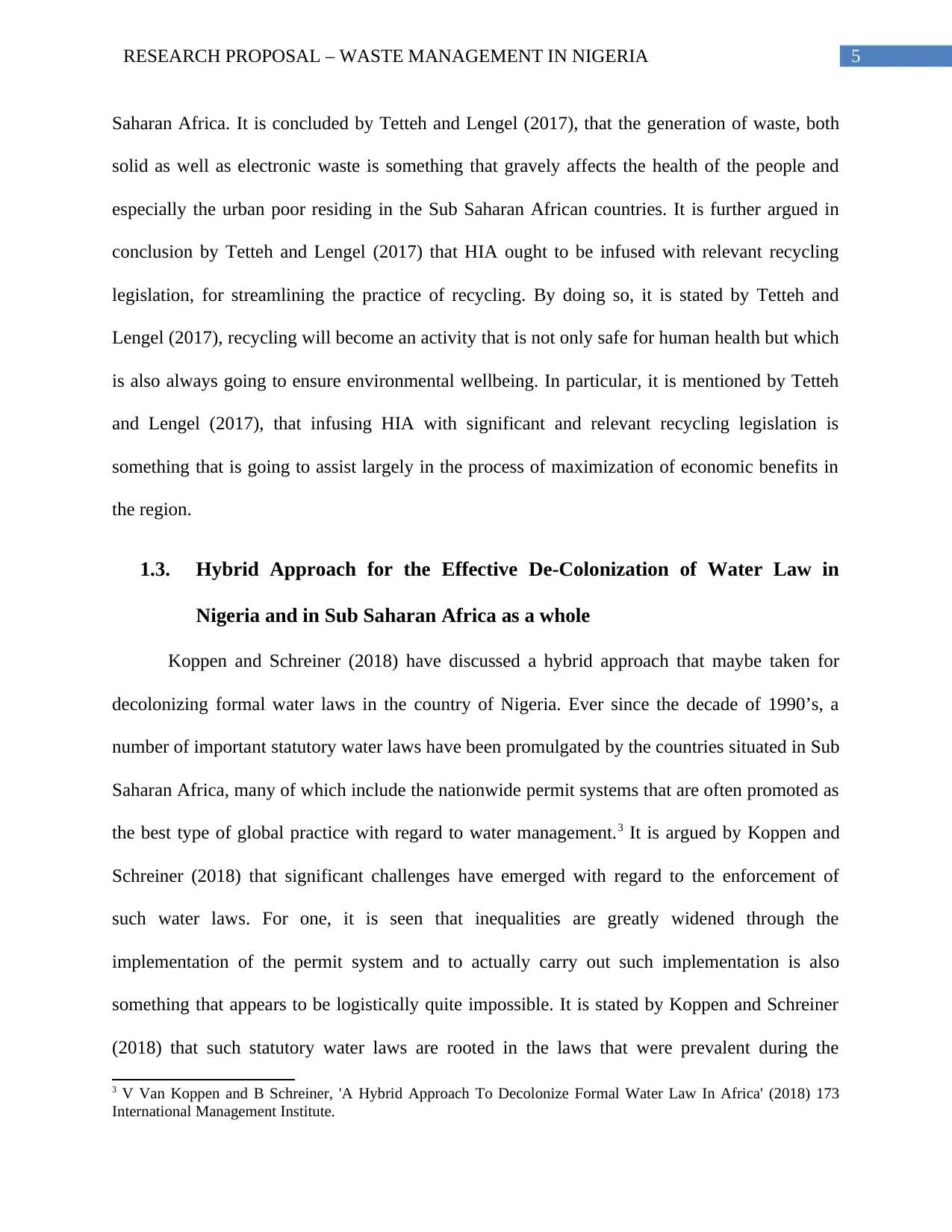
5RESEARCH PROPOSAL – WASTE MANAGEMENT IN NIGERIA
Saharan Africa. It is concluded by Tetteh and Lengel (2017), that the generation of waste, both
solid as well as electronic waste is something that gravely affects the health of the people and
especially the urban poor residing in the Sub Saharan African countries. It is further argued in
conclusion by Tetteh and Lengel (2017) that HIA ought to be infused with relevant recycling
legislation, for streamlining the practice of recycling. By doing so, it is stated by Tetteh and
Lengel (2017), recycling will become an activity that is not only safe for human health but which
is also always going to ensure environmental wellbeing. In particular, it is mentioned by Tetteh
and Lengel (2017), that infusing HIA with significant and relevant recycling legislation is
something that is going to assist largely in the process of maximization of economic benefits in
the region.
1.3. Hybrid Approach for the Effective De-Colonization of Water Law in
Nigeria and in Sub Saharan Africa as a whole
Koppen and Schreiner (2018) have discussed a hybrid approach that maybe taken for
decolonizing formal water laws in the country of Nigeria. Ever since the decade of 1990’s, a
number of important statutory water laws have been promulgated by the countries situated in Sub
Saharan Africa, many of which include the nationwide permit systems that are often promoted as
the best type of global practice with regard to water management.3 It is argued by Koppen and
Schreiner (2018) that significant challenges have emerged with regard to the enforcement of
such water laws. For one, it is seen that inequalities are greatly widened through the
implementation of the permit system and to actually carry out such implementation is also
something that appears to be logistically quite impossible. It is stated by Koppen and Schreiner
(2018) that such statutory water laws are rooted in the laws that were prevalent during the
3 V Van Koppen and B Schreiner, 'A Hybrid Approach To Decolonize Formal Water Law In Africa' (2018) 173
International Management Institute.
Saharan Africa. It is concluded by Tetteh and Lengel (2017), that the generation of waste, both
solid as well as electronic waste is something that gravely affects the health of the people and
especially the urban poor residing in the Sub Saharan African countries. It is further argued in
conclusion by Tetteh and Lengel (2017) that HIA ought to be infused with relevant recycling
legislation, for streamlining the practice of recycling. By doing so, it is stated by Tetteh and
Lengel (2017), recycling will become an activity that is not only safe for human health but which
is also always going to ensure environmental wellbeing. In particular, it is mentioned by Tetteh
and Lengel (2017), that infusing HIA with significant and relevant recycling legislation is
something that is going to assist largely in the process of maximization of economic benefits in
the region.
1.3. Hybrid Approach for the Effective De-Colonization of Water Law in
Nigeria and in Sub Saharan Africa as a whole
Koppen and Schreiner (2018) have discussed a hybrid approach that maybe taken for
decolonizing formal water laws in the country of Nigeria. Ever since the decade of 1990’s, a
number of important statutory water laws have been promulgated by the countries situated in Sub
Saharan Africa, many of which include the nationwide permit systems that are often promoted as
the best type of global practice with regard to water management.3 It is argued by Koppen and
Schreiner (2018) that significant challenges have emerged with regard to the enforcement of
such water laws. For one, it is seen that inequalities are greatly widened through the
implementation of the permit system and to actually carry out such implementation is also
something that appears to be logistically quite impossible. It is stated by Koppen and Schreiner
(2018) that such statutory water laws are rooted in the laws that were prevalent during the
3 V Van Koppen and B Schreiner, 'A Hybrid Approach To Decolonize Formal Water Law In Africa' (2018) 173
International Management Institute.
⊘ This is a preview!⊘
Do you want full access?
Subscribe today to unlock all pages.

Trusted by 1+ million students worldwide
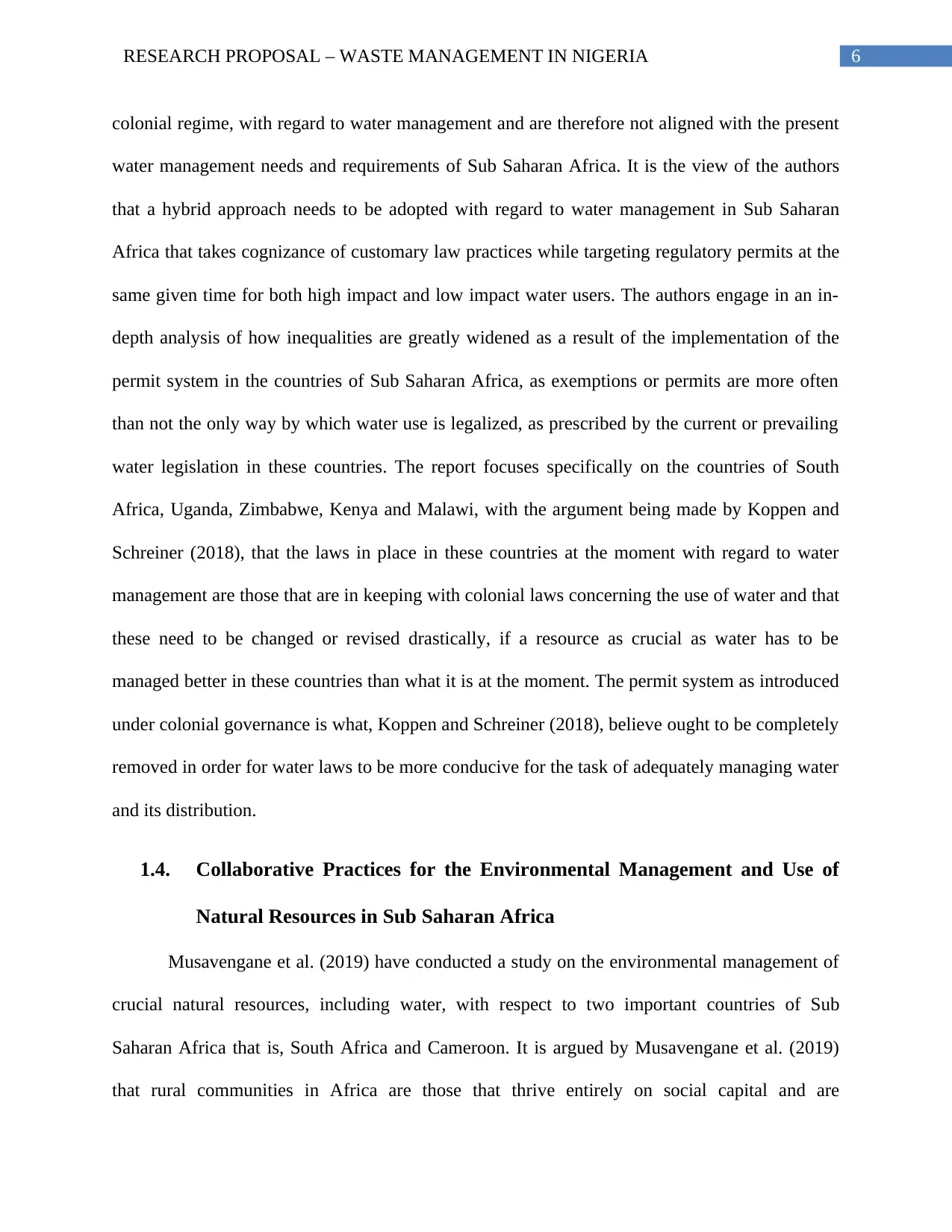
6RESEARCH PROPOSAL – WASTE MANAGEMENT IN NIGERIA
colonial regime, with regard to water management and are therefore not aligned with the present
water management needs and requirements of Sub Saharan Africa. It is the view of the authors
that a hybrid approach needs to be adopted with regard to water management in Sub Saharan
Africa that takes cognizance of customary law practices while targeting regulatory permits at the
same given time for both high impact and low impact water users. The authors engage in an in-
depth analysis of how inequalities are greatly widened as a result of the implementation of the
permit system in the countries of Sub Saharan Africa, as exemptions or permits are more often
than not the only way by which water use is legalized, as prescribed by the current or prevailing
water legislation in these countries. The report focuses specifically on the countries of South
Africa, Uganda, Zimbabwe, Kenya and Malawi, with the argument being made by Koppen and
Schreiner (2018), that the laws in place in these countries at the moment with regard to water
management are those that are in keeping with colonial laws concerning the use of water and that
these need to be changed or revised drastically, if a resource as crucial as water has to be
managed better in these countries than what it is at the moment. The permit system as introduced
under colonial governance is what, Koppen and Schreiner (2018), believe ought to be completely
removed in order for water laws to be more conducive for the task of adequately managing water
and its distribution.
1.4. Collaborative Practices for the Environmental Management and Use of
Natural Resources in Sub Saharan Africa
Musavengane et al. (2019) have conducted a study on the environmental management of
crucial natural resources, including water, with respect to two important countries of Sub
Saharan Africa that is, South Africa and Cameroon. It is argued by Musavengane et al. (2019)
that rural communities in Africa are those that thrive entirely on social capital and are
colonial regime, with regard to water management and are therefore not aligned with the present
water management needs and requirements of Sub Saharan Africa. It is the view of the authors
that a hybrid approach needs to be adopted with regard to water management in Sub Saharan
Africa that takes cognizance of customary law practices while targeting regulatory permits at the
same given time for both high impact and low impact water users. The authors engage in an in-
depth analysis of how inequalities are greatly widened as a result of the implementation of the
permit system in the countries of Sub Saharan Africa, as exemptions or permits are more often
than not the only way by which water use is legalized, as prescribed by the current or prevailing
water legislation in these countries. The report focuses specifically on the countries of South
Africa, Uganda, Zimbabwe, Kenya and Malawi, with the argument being made by Koppen and
Schreiner (2018), that the laws in place in these countries at the moment with regard to water
management are those that are in keeping with colonial laws concerning the use of water and that
these need to be changed or revised drastically, if a resource as crucial as water has to be
managed better in these countries than what it is at the moment. The permit system as introduced
under colonial governance is what, Koppen and Schreiner (2018), believe ought to be completely
removed in order for water laws to be more conducive for the task of adequately managing water
and its distribution.
1.4. Collaborative Practices for the Environmental Management and Use of
Natural Resources in Sub Saharan Africa
Musavengane et al. (2019) have conducted a study on the environmental management of
crucial natural resources, including water, with respect to two important countries of Sub
Saharan Africa that is, South Africa and Cameroon. It is argued by Musavengane et al. (2019)
that rural communities in Africa are those that thrive entirely on social capital and are
Paraphrase This Document
Need a fresh take? Get an instant paraphrase of this document with our AI Paraphraser
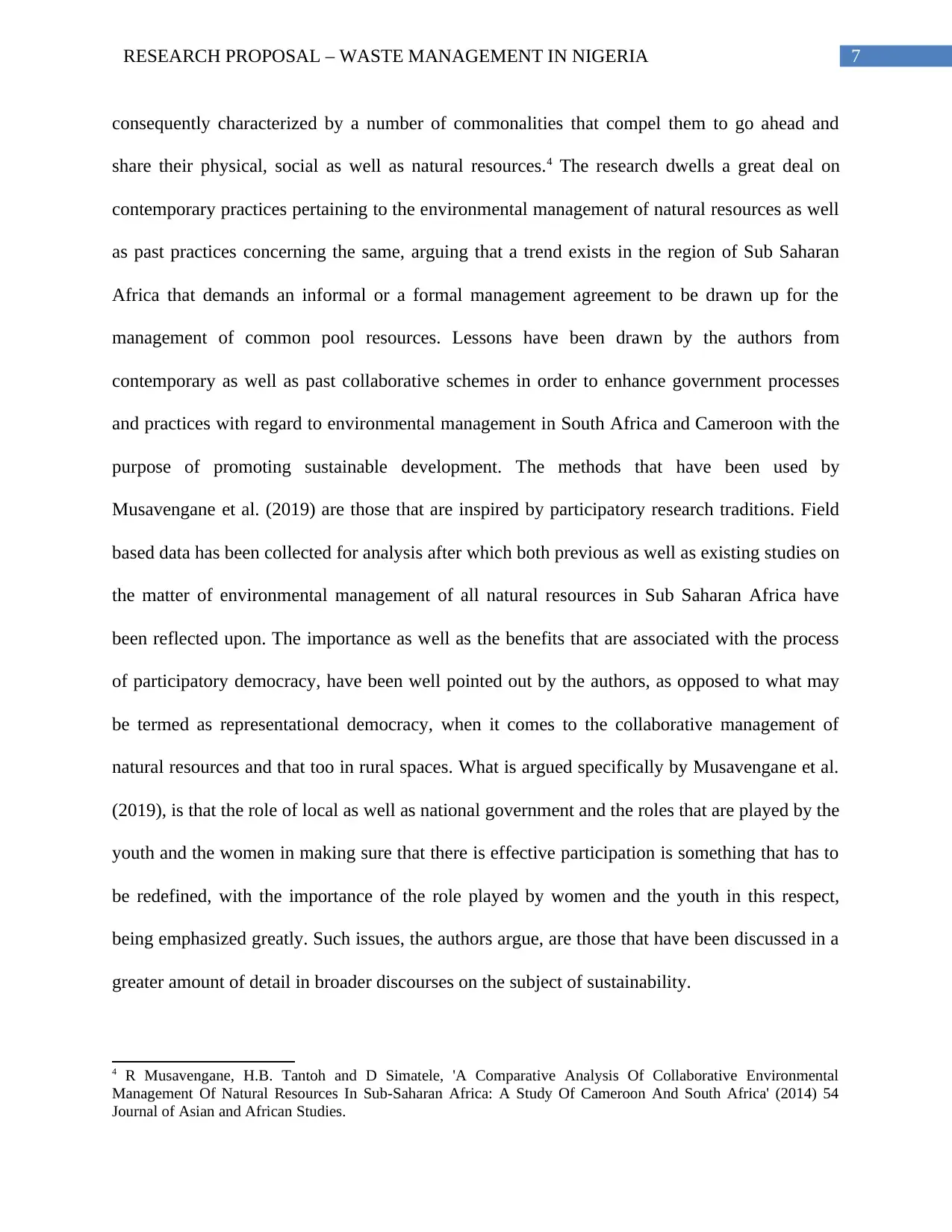
7RESEARCH PROPOSAL – WASTE MANAGEMENT IN NIGERIA
consequently characterized by a number of commonalities that compel them to go ahead and
share their physical, social as well as natural resources.4 The research dwells a great deal on
contemporary practices pertaining to the environmental management of natural resources as well
as past practices concerning the same, arguing that a trend exists in the region of Sub Saharan
Africa that demands an informal or a formal management agreement to be drawn up for the
management of common pool resources. Lessons have been drawn by the authors from
contemporary as well as past collaborative schemes in order to enhance government processes
and practices with regard to environmental management in South Africa and Cameroon with the
purpose of promoting sustainable development. The methods that have been used by
Musavengane et al. (2019) are those that are inspired by participatory research traditions. Field
based data has been collected for analysis after which both previous as well as existing studies on
the matter of environmental management of all natural resources in Sub Saharan Africa have
been reflected upon. The importance as well as the benefits that are associated with the process
of participatory democracy, have been well pointed out by the authors, as opposed to what may
be termed as representational democracy, when it comes to the collaborative management of
natural resources and that too in rural spaces. What is argued specifically by Musavengane et al.
(2019), is that the role of local as well as national government and the roles that are played by the
youth and the women in making sure that there is effective participation is something that has to
be redefined, with the importance of the role played by women and the youth in this respect,
being emphasized greatly. Such issues, the authors argue, are those that have been discussed in a
greater amount of detail in broader discourses on the subject of sustainability.
4 R Musavengane, H.B. Tantoh and D Simatele, 'A Comparative Analysis Of Collaborative Environmental
Management Of Natural Resources In Sub-Saharan Africa: A Study Of Cameroon And South Africa' (2014) 54
Journal of Asian and African Studies.
consequently characterized by a number of commonalities that compel them to go ahead and
share their physical, social as well as natural resources.4 The research dwells a great deal on
contemporary practices pertaining to the environmental management of natural resources as well
as past practices concerning the same, arguing that a trend exists in the region of Sub Saharan
Africa that demands an informal or a formal management agreement to be drawn up for the
management of common pool resources. Lessons have been drawn by the authors from
contemporary as well as past collaborative schemes in order to enhance government processes
and practices with regard to environmental management in South Africa and Cameroon with the
purpose of promoting sustainable development. The methods that have been used by
Musavengane et al. (2019) are those that are inspired by participatory research traditions. Field
based data has been collected for analysis after which both previous as well as existing studies on
the matter of environmental management of all natural resources in Sub Saharan Africa have
been reflected upon. The importance as well as the benefits that are associated with the process
of participatory democracy, have been well pointed out by the authors, as opposed to what may
be termed as representational democracy, when it comes to the collaborative management of
natural resources and that too in rural spaces. What is argued specifically by Musavengane et al.
(2019), is that the role of local as well as national government and the roles that are played by the
youth and the women in making sure that there is effective participation is something that has to
be redefined, with the importance of the role played by women and the youth in this respect,
being emphasized greatly. Such issues, the authors argue, are those that have been discussed in a
greater amount of detail in broader discourses on the subject of sustainability.
4 R Musavengane, H.B. Tantoh and D Simatele, 'A Comparative Analysis Of Collaborative Environmental
Management Of Natural Resources In Sub-Saharan Africa: A Study Of Cameroon And South Africa' (2014) 54
Journal of Asian and African Studies.
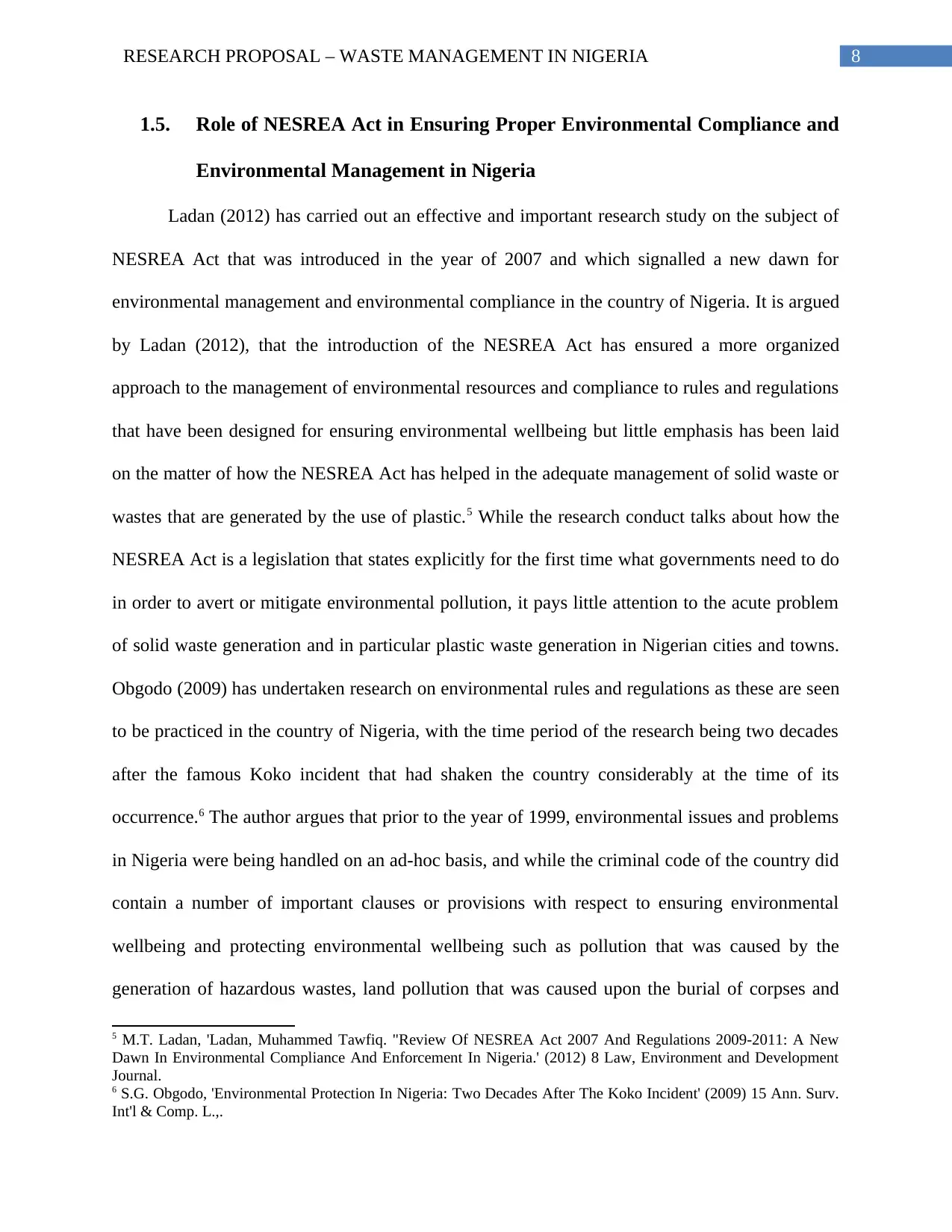
8RESEARCH PROPOSAL – WASTE MANAGEMENT IN NIGERIA
1.5. Role of NESREA Act in Ensuring Proper Environmental Compliance and
Environmental Management in Nigeria
Ladan (2012) has carried out an effective and important research study on the subject of
NESREA Act that was introduced in the year of 2007 and which signalled a new dawn for
environmental management and environmental compliance in the country of Nigeria. It is argued
by Ladan (2012), that the introduction of the NESREA Act has ensured a more organized
approach to the management of environmental resources and compliance to rules and regulations
that have been designed for ensuring environmental wellbeing but little emphasis has been laid
on the matter of how the NESREA Act has helped in the adequate management of solid waste or
wastes that are generated by the use of plastic.5 While the research conduct talks about how the
NESREA Act is a legislation that states explicitly for the first time what governments need to do
in order to avert or mitigate environmental pollution, it pays little attention to the acute problem
of solid waste generation and in particular plastic waste generation in Nigerian cities and towns.
Obgodo (2009) has undertaken research on environmental rules and regulations as these are seen
to be practiced in the country of Nigeria, with the time period of the research being two decades
after the famous Koko incident that had shaken the country considerably at the time of its
occurrence.6 The author argues that prior to the year of 1999, environmental issues and problems
in Nigeria were being handled on an ad-hoc basis, and while the criminal code of the country did
contain a number of important clauses or provisions with respect to ensuring environmental
wellbeing and protecting environmental wellbeing such as pollution that was caused by the
generation of hazardous wastes, land pollution that was caused upon the burial of corpses and
5 M.T. Ladan, 'Ladan, Muhammed Tawfiq. "Review Of NESREA Act 2007 And Regulations 2009-2011: A New
Dawn In Environmental Compliance And Enforcement In Nigeria.' (2012) 8 Law, Environment and Development
Journal.
6 S.G. Obgodo, 'Environmental Protection In Nigeria: Two Decades After The Koko Incident' (2009) 15 Ann. Surv.
Int'l & Comp. L.,.
1.5. Role of NESREA Act in Ensuring Proper Environmental Compliance and
Environmental Management in Nigeria
Ladan (2012) has carried out an effective and important research study on the subject of
NESREA Act that was introduced in the year of 2007 and which signalled a new dawn for
environmental management and environmental compliance in the country of Nigeria. It is argued
by Ladan (2012), that the introduction of the NESREA Act has ensured a more organized
approach to the management of environmental resources and compliance to rules and regulations
that have been designed for ensuring environmental wellbeing but little emphasis has been laid
on the matter of how the NESREA Act has helped in the adequate management of solid waste or
wastes that are generated by the use of plastic.5 While the research conduct talks about how the
NESREA Act is a legislation that states explicitly for the first time what governments need to do
in order to avert or mitigate environmental pollution, it pays little attention to the acute problem
of solid waste generation and in particular plastic waste generation in Nigerian cities and towns.
Obgodo (2009) has undertaken research on environmental rules and regulations as these are seen
to be practiced in the country of Nigeria, with the time period of the research being two decades
after the famous Koko incident that had shaken the country considerably at the time of its
occurrence.6 The author argues that prior to the year of 1999, environmental issues and problems
in Nigeria were being handled on an ad-hoc basis, and while the criminal code of the country did
contain a number of important clauses or provisions with respect to ensuring environmental
wellbeing and protecting environmental wellbeing such as pollution that was caused by the
generation of hazardous wastes, land pollution that was caused upon the burial of corpses and
5 M.T. Ladan, 'Ladan, Muhammed Tawfiq. "Review Of NESREA Act 2007 And Regulations 2009-2011: A New
Dawn In Environmental Compliance And Enforcement In Nigeria.' (2012) 8 Law, Environment and Development
Journal.
6 S.G. Obgodo, 'Environmental Protection In Nigeria: Two Decades After The Koko Incident' (2009) 15 Ann. Surv.
Int'l & Comp. L.,.
⊘ This is a preview!⊘
Do you want full access?
Subscribe today to unlock all pages.

Trusted by 1+ million students worldwide
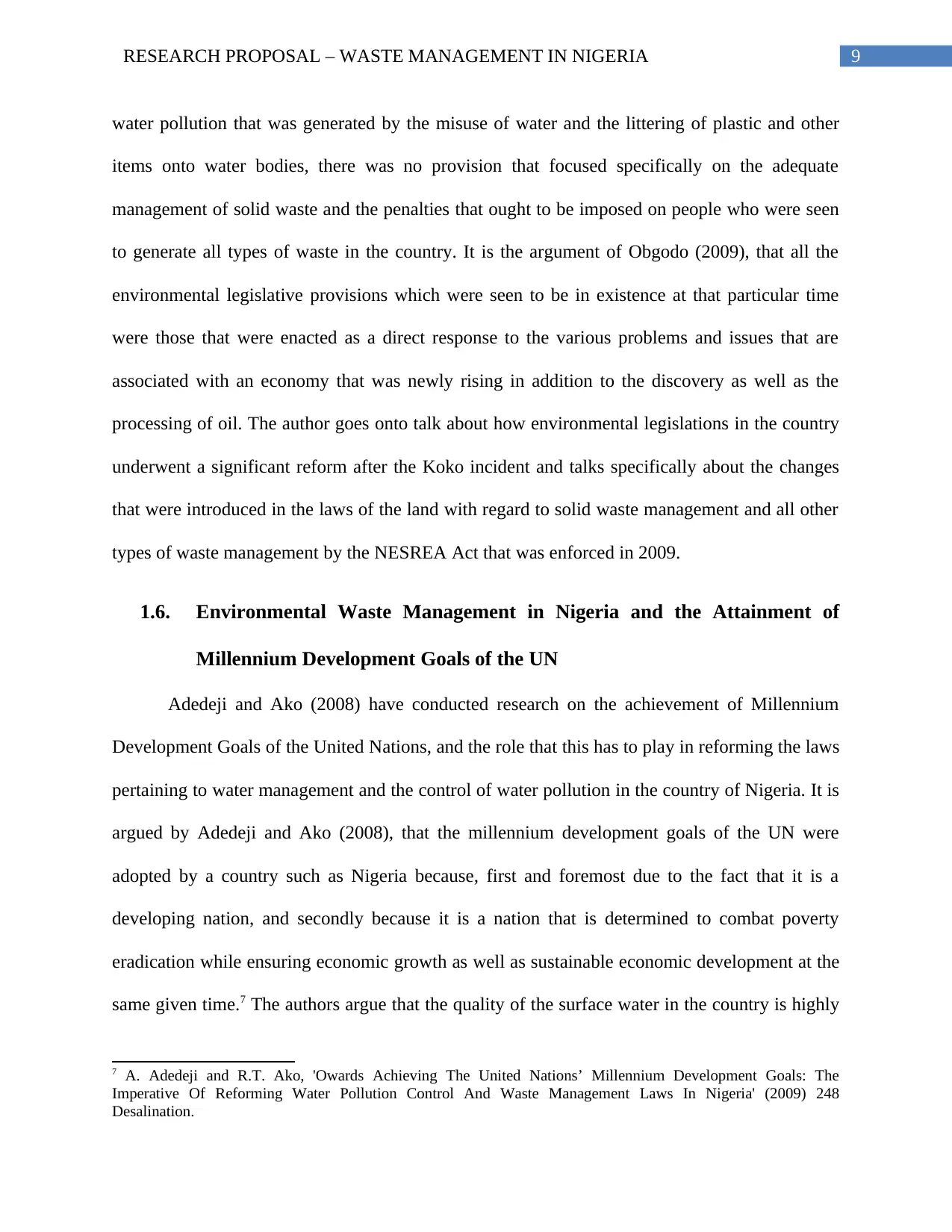
9RESEARCH PROPOSAL – WASTE MANAGEMENT IN NIGERIA
water pollution that was generated by the misuse of water and the littering of plastic and other
items onto water bodies, there was no provision that focused specifically on the adequate
management of solid waste and the penalties that ought to be imposed on people who were seen
to generate all types of waste in the country. It is the argument of Obgodo (2009), that all the
environmental legislative provisions which were seen to be in existence at that particular time
were those that were enacted as a direct response to the various problems and issues that are
associated with an economy that was newly rising in addition to the discovery as well as the
processing of oil. The author goes onto talk about how environmental legislations in the country
underwent a significant reform after the Koko incident and talks specifically about the changes
that were introduced in the laws of the land with regard to solid waste management and all other
types of waste management by the NESREA Act that was enforced in 2009.
1.6. Environmental Waste Management in Nigeria and the Attainment of
Millennium Development Goals of the UN
Adedeji and Ako (2008) have conducted research on the achievement of Millennium
Development Goals of the United Nations, and the role that this has to play in reforming the laws
pertaining to water management and the control of water pollution in the country of Nigeria. It is
argued by Adedeji and Ako (2008), that the millennium development goals of the UN were
adopted by a country such as Nigeria because, first and foremost due to the fact that it is a
developing nation, and secondly because it is a nation that is determined to combat poverty
eradication while ensuring economic growth as well as sustainable economic development at the
same given time.7 The authors argue that the quality of the surface water in the country is highly
7 A. Adedeji and R.T. Ako, 'Owards Achieving The United Nations’ Millennium Development Goals: The
Imperative Of Reforming Water Pollution Control And Waste Management Laws In Nigeria' (2009) 248
Desalination.
water pollution that was generated by the misuse of water and the littering of plastic and other
items onto water bodies, there was no provision that focused specifically on the adequate
management of solid waste and the penalties that ought to be imposed on people who were seen
to generate all types of waste in the country. It is the argument of Obgodo (2009), that all the
environmental legislative provisions which were seen to be in existence at that particular time
were those that were enacted as a direct response to the various problems and issues that are
associated with an economy that was newly rising in addition to the discovery as well as the
processing of oil. The author goes onto talk about how environmental legislations in the country
underwent a significant reform after the Koko incident and talks specifically about the changes
that were introduced in the laws of the land with regard to solid waste management and all other
types of waste management by the NESREA Act that was enforced in 2009.
1.6. Environmental Waste Management in Nigeria and the Attainment of
Millennium Development Goals of the UN
Adedeji and Ako (2008) have conducted research on the achievement of Millennium
Development Goals of the United Nations, and the role that this has to play in reforming the laws
pertaining to water management and the control of water pollution in the country of Nigeria. It is
argued by Adedeji and Ako (2008), that the millennium development goals of the UN were
adopted by a country such as Nigeria because, first and foremost due to the fact that it is a
developing nation, and secondly because it is a nation that is determined to combat poverty
eradication while ensuring economic growth as well as sustainable economic development at the
same given time.7 The authors argue that the quality of the surface water in the country is highly
7 A. Adedeji and R.T. Ako, 'Owards Achieving The United Nations’ Millennium Development Goals: The
Imperative Of Reforming Water Pollution Control And Waste Management Laws In Nigeria' (2009) 248
Desalination.
Paraphrase This Document
Need a fresh take? Get an instant paraphrase of this document with our AI Paraphraser
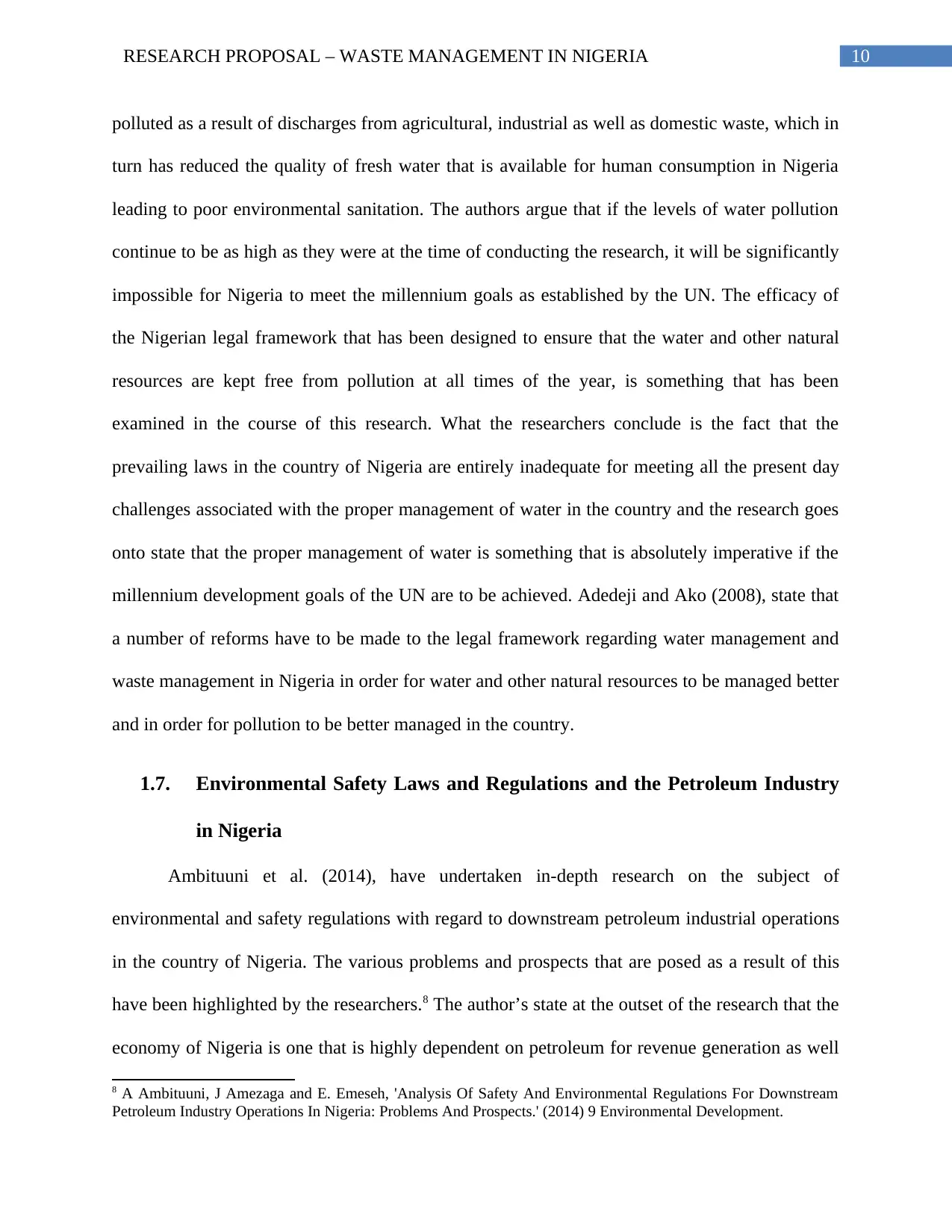
10RESEARCH PROPOSAL – WASTE MANAGEMENT IN NIGERIA
polluted as a result of discharges from agricultural, industrial as well as domestic waste, which in
turn has reduced the quality of fresh water that is available for human consumption in Nigeria
leading to poor environmental sanitation. The authors argue that if the levels of water pollution
continue to be as high as they were at the time of conducting the research, it will be significantly
impossible for Nigeria to meet the millennium goals as established by the UN. The efficacy of
the Nigerian legal framework that has been designed to ensure that the water and other natural
resources are kept free from pollution at all times of the year, is something that has been
examined in the course of this research. What the researchers conclude is the fact that the
prevailing laws in the country of Nigeria are entirely inadequate for meeting all the present day
challenges associated with the proper management of water in the country and the research goes
onto state that the proper management of water is something that is absolutely imperative if the
millennium development goals of the UN are to be achieved. Adedeji and Ako (2008), state that
a number of reforms have to be made to the legal framework regarding water management and
waste management in Nigeria in order for water and other natural resources to be managed better
and in order for pollution to be better managed in the country.
1.7. Environmental Safety Laws and Regulations and the Petroleum Industry
in Nigeria
Ambituuni et al. (2014), have undertaken in-depth research on the subject of
environmental and safety regulations with regard to downstream petroleum industrial operations
in the country of Nigeria. The various problems and prospects that are posed as a result of this
have been highlighted by the researchers.8 The author’s state at the outset of the research that the
economy of Nigeria is one that is highly dependent on petroleum for revenue generation as well
8 A Ambituuni, J Amezaga and E. Emeseh, 'Analysis Of Safety And Environmental Regulations For Downstream
Petroleum Industry Operations In Nigeria: Problems And Prospects.' (2014) 9 Environmental Development.
polluted as a result of discharges from agricultural, industrial as well as domestic waste, which in
turn has reduced the quality of fresh water that is available for human consumption in Nigeria
leading to poor environmental sanitation. The authors argue that if the levels of water pollution
continue to be as high as they were at the time of conducting the research, it will be significantly
impossible for Nigeria to meet the millennium goals as established by the UN. The efficacy of
the Nigerian legal framework that has been designed to ensure that the water and other natural
resources are kept free from pollution at all times of the year, is something that has been
examined in the course of this research. What the researchers conclude is the fact that the
prevailing laws in the country of Nigeria are entirely inadequate for meeting all the present day
challenges associated with the proper management of water in the country and the research goes
onto state that the proper management of water is something that is absolutely imperative if the
millennium development goals of the UN are to be achieved. Adedeji and Ako (2008), state that
a number of reforms have to be made to the legal framework regarding water management and
waste management in Nigeria in order for water and other natural resources to be managed better
and in order for pollution to be better managed in the country.
1.7. Environmental Safety Laws and Regulations and the Petroleum Industry
in Nigeria
Ambituuni et al. (2014), have undertaken in-depth research on the subject of
environmental and safety regulations with regard to downstream petroleum industrial operations
in the country of Nigeria. The various problems and prospects that are posed as a result of this
have been highlighted by the researchers.8 The author’s state at the outset of the research that the
economy of Nigeria is one that is highly dependent on petroleum for revenue generation as well
8 A Ambituuni, J Amezaga and E. Emeseh, 'Analysis Of Safety And Environmental Regulations For Downstream
Petroleum Industry Operations In Nigeria: Problems And Prospects.' (2014) 9 Environmental Development.
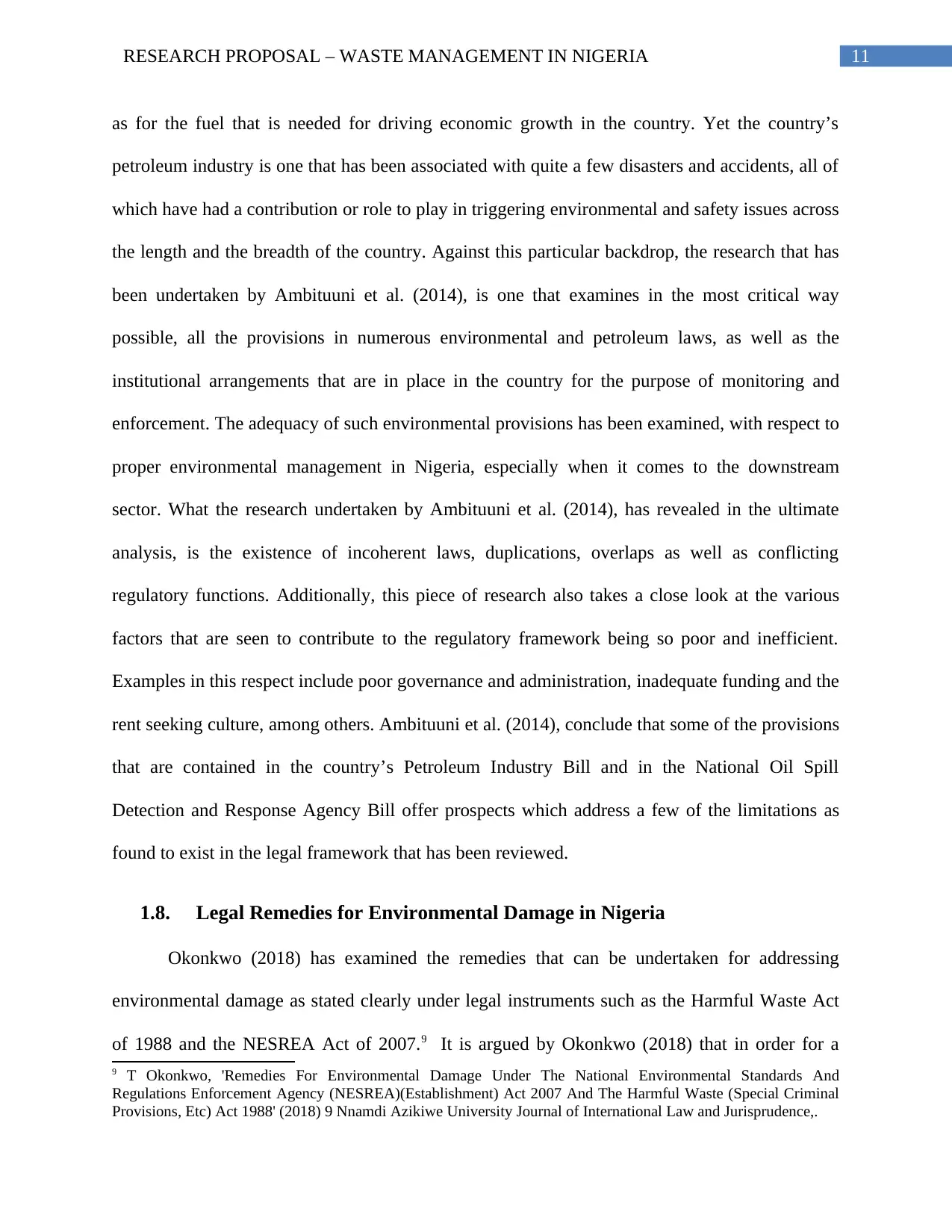
11RESEARCH PROPOSAL – WASTE MANAGEMENT IN NIGERIA
as for the fuel that is needed for driving economic growth in the country. Yet the country’s
petroleum industry is one that has been associated with quite a few disasters and accidents, all of
which have had a contribution or role to play in triggering environmental and safety issues across
the length and the breadth of the country. Against this particular backdrop, the research that has
been undertaken by Ambituuni et al. (2014), is one that examines in the most critical way
possible, all the provisions in numerous environmental and petroleum laws, as well as the
institutional arrangements that are in place in the country for the purpose of monitoring and
enforcement. The adequacy of such environmental provisions has been examined, with respect to
proper environmental management in Nigeria, especially when it comes to the downstream
sector. What the research undertaken by Ambituuni et al. (2014), has revealed in the ultimate
analysis, is the existence of incoherent laws, duplications, overlaps as well as conflicting
regulatory functions. Additionally, this piece of research also takes a close look at the various
factors that are seen to contribute to the regulatory framework being so poor and inefficient.
Examples in this respect include poor governance and administration, inadequate funding and the
rent seeking culture, among others. Ambituuni et al. (2014), conclude that some of the provisions
that are contained in the country’s Petroleum Industry Bill and in the National Oil Spill
Detection and Response Agency Bill offer prospects which address a few of the limitations as
found to exist in the legal framework that has been reviewed.
1.8. Legal Remedies for Environmental Damage in Nigeria
Okonkwo (2018) has examined the remedies that can be undertaken for addressing
environmental damage as stated clearly under legal instruments such as the Harmful Waste Act
of 1988 and the NESREA Act of 2007.9 It is argued by Okonkwo (2018) that in order for a
9 T Okonkwo, 'Remedies For Environmental Damage Under The National Environmental Standards And
Regulations Enforcement Agency (NESREA)(Establishment) Act 2007 And The Harmful Waste (Special Criminal
Provisions, Etc) Act 1988' (2018) 9 Nnamdi Azikiwe University Journal of International Law and Jurisprudence,.
as for the fuel that is needed for driving economic growth in the country. Yet the country’s
petroleum industry is one that has been associated with quite a few disasters and accidents, all of
which have had a contribution or role to play in triggering environmental and safety issues across
the length and the breadth of the country. Against this particular backdrop, the research that has
been undertaken by Ambituuni et al. (2014), is one that examines in the most critical way
possible, all the provisions in numerous environmental and petroleum laws, as well as the
institutional arrangements that are in place in the country for the purpose of monitoring and
enforcement. The adequacy of such environmental provisions has been examined, with respect to
proper environmental management in Nigeria, especially when it comes to the downstream
sector. What the research undertaken by Ambituuni et al. (2014), has revealed in the ultimate
analysis, is the existence of incoherent laws, duplications, overlaps as well as conflicting
regulatory functions. Additionally, this piece of research also takes a close look at the various
factors that are seen to contribute to the regulatory framework being so poor and inefficient.
Examples in this respect include poor governance and administration, inadequate funding and the
rent seeking culture, among others. Ambituuni et al. (2014), conclude that some of the provisions
that are contained in the country’s Petroleum Industry Bill and in the National Oil Spill
Detection and Response Agency Bill offer prospects which address a few of the limitations as
found to exist in the legal framework that has been reviewed.
1.8. Legal Remedies for Environmental Damage in Nigeria
Okonkwo (2018) has examined the remedies that can be undertaken for addressing
environmental damage as stated clearly under legal instruments such as the Harmful Waste Act
of 1988 and the NESREA Act of 2007.9 It is argued by Okonkwo (2018) that in order for a
9 T Okonkwo, 'Remedies For Environmental Damage Under The National Environmental Standards And
Regulations Enforcement Agency (NESREA)(Establishment) Act 2007 And The Harmful Waste (Special Criminal
Provisions, Etc) Act 1988' (2018) 9 Nnamdi Azikiwe University Journal of International Law and Jurisprudence,.
⊘ This is a preview!⊘
Do you want full access?
Subscribe today to unlock all pages.

Trusted by 1+ million students worldwide
1 out of 20
Related Documents
Your All-in-One AI-Powered Toolkit for Academic Success.
+13062052269
info@desklib.com
Available 24*7 on WhatsApp / Email
![[object Object]](/_next/static/media/star-bottom.7253800d.svg)
Unlock your academic potential
Copyright © 2020–2026 A2Z Services. All Rights Reserved. Developed and managed by ZUCOL.





